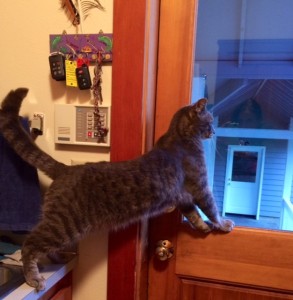Purpose. Meaning. Life.
 Another day, another load of garbage delivered to my email in-box, the result of my long-standing Google alert for “anti-aging.” For more than 6 years, ever since I first started researching the science of aging for my book, Counterclockwise, I’ve been slogging through these daily “news” (yes, in quotes) items that purport to alert me to the latest and greatest information.
Another day, another load of garbage delivered to my email in-box, the result of my long-standing Google alert for “anti-aging.” For more than 6 years, ever since I first started researching the science of aging for my book, Counterclockwise, I’ve been slogging through these daily “news” (yes, in quotes) items that purport to alert me to the latest and greatest information.
A good 75 percent of the items are about skin creams. Because, you know, the path to an engaged, vigorous, healthy life is surely to smooth out laugh lines. The other alerts run the gamut from the newest superfood (Are people still falling for that? Did we learn nothing from the Great Kale Hoax?) to the ultimate fitness regimen, with occasional tidbits on detoxing, botoxing, fasting, dead-skin eating fish, leech facials and the habits of celebrities far too young to have any experience with aging.
In more than 6 years, I have never ever gotten an alert to a story that suggests that “anti” aging is not a battle against the process of life but rather a positive approach to living life to its fullest, to pushing boundaries, to raising the bar, to living with engagement and joy and…purpose.
Yes, living a life with a sense of purpose may be the ultimate ”anti” aging strategy.
A while back, I wrote about meeting a vigorous, energetic 92-year-old woman who does just that. You may remember that I’ve also written about a related subject: volunteering, which can provide a strong sense of purpose. I mentioned a 2013 study published in the journal Psychology and Aging that found that mid-life adults who volunteered about 4 hours a week were 40 percent less likely to develop high blood pressure 4 years later. Other studies discovered fewer health complaints, higher functional ability, less depression and anxiety, and less incidence of heart disease among volunteers than among matched sets of non-volunteers.
Here’s more evidence: National Institute on Aging-funded research based on more than 6,000 mid-life people found that people with a sense of purpose had a 15 percent lower risk of death, compared to their more aimless counterparts. The Canadian researchers controlled for other factors known to affect longevity like gender, age and emotional and psychological well-being. Sense of purpose trumped them all.
And, guess what? It didn’t appear to make a difference when these people found that purpose. It could have been in college. It could have been after retirement. You might be interested to know that “sense of purpose” is not limited to the grandiose – joining the Peace Corps, cleaning up a toxic river – but also involves the personal (insuring the well-being of one’s family, producing creative work).
Exactly how purpose benefits health is not clear. It might be that individuals with a sense of purpose are also purposeful about their own health and so lead healthier lives than others. But a likely explanation – especially given the research on the health benefits of volunteering – is that sense of purpose increases self-esteem, happiness and optimism, all traits associated with a myriad of health benefits. The researchers hypothesize that a sense of purpose may protect against the harmful effects of stress, one of the great systemic agers.
All of which goes to prove that living a healthy, vigorous and long life is not about miracle face creams or miracle foods or miracle work-outs. It is about the everyday miracle of building a rich, purposeful life.






4 comments
Indeed! “Healthy” undoubtedly includes cognitive health as well as physical health, and it appears that purpose in life has the benefit of delaying cognitive decline and the development of Alzheimer’s. http://archpsyc.jamanetwork.com/article.aspx?articleid=210648
Even if formal volunteering isn’t someone’s cup of tea (that can be hard for some introverts), it’s possible to develop an activity that reflects your own sense of purpose…like an octogenarian neighbor of mine who picks up litter.
Yes! “Healthy” is absolutely cognitive health. And there are so many ways to live a life of purpose and meaning.
I think a large part of why having a purpose is so important to a longer, healthier life is that it implies movement towards something. In nature nothing is truly static. Water that doesn’t have movement becomes stagnant, life perishes. Muscles that aren’t used begin to catabolize and atrophy. If we don’t continue to learn we forget more and more. Therefore purpose creates life in the living.
Love this topic, I’m often pondering my own purpose and I spend time examining the meaning I attach to life events, past and present. Making sure the meanings support having a purpose.
I love the idea of purpose as motion. Thanks for this, Nicola.
Leave a Comment